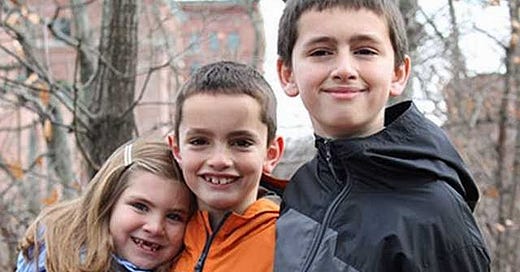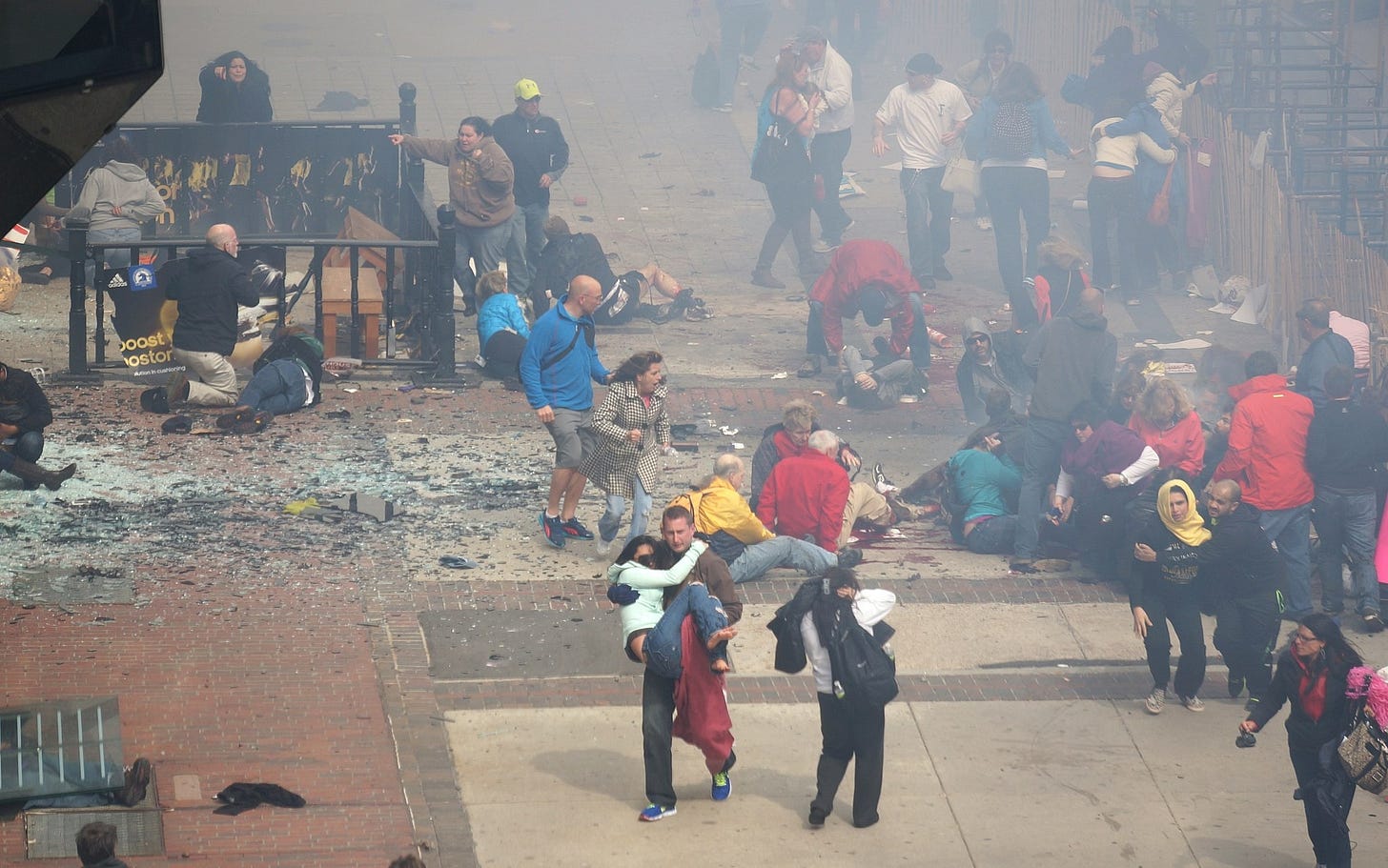The Mysteries of History (April 15 Edition)
Abraham Lincoln Dies; Titanic Sinks; Jackie Robinson Makes a Giant Leap; McDonald's Opens; Boston Marathon Rocked
1865 — Abraham Lincoln Dies
public domain image from wikimedia commons
For most of the story, see yesterday’s post (April 14, the day Lincoln was shot) here.
Celebrated contemporary poet Walt Whitman wrote a poem for/about Lincoln after his death (which was also featured prominently in the Robin Williams movie Dead Poets Society) called O Captain! My Captain! which can be read here.
J.W. Booth “succeeded” in killing Lincoln, but had also plotted to kill two possible successors: the Vice President, Andrew Johnson; and the Secretary of State and real estate broker William Seward (Alaska, aka “Seward’s Folly” at the time).
Andrew Johnson did become President and, not so unlike his fellow Tennessean Andrew Jackson before him, tended to be pro-Southern in his attitudes and actions, so Booth may have been happy Johnson escaped assassination (had Booth lived to see Johnson’s true colors be shown).
Booth died in a barn in rural Virginia on April 26th, by the same method Lincoln died (he was shot while the barn around him burned). To paraphrase the Bible, “You live by the gun, you die by the gun.”
Questions: Have you seen Daniel Day-Lewis’ portrayal of Lincoln in the 2012 movie of the same name? Which Booth family members achieved fame of their own? Where was Lincoln born? Where was he buried?
1912 — Titanic Sinks
public domain images from wikimedia commons
The following is what I wrote about the Titanic’s first and last voyage in my book Still Casting Shadows: A Shared Mosaic of U.S. History — Volume 1: 1620-1913:
Fourteen years earlier, in 1898, Morgan Robertson had written a novel about a new, supposedly unsinkable, eight hundred foot ocean liner named Titan which—in the novel—sank in the Atlantic on its maiden voyage after hitting an iceberg in April.
The supposedly unsinkable 882-foot double-hulled ship The Titanic, on its maiden voyage, struck an iceberg late on April 14th, 1912, and sank a little after midnight the next day, on that fateful date which is still dreaded by tax payers (the Federal income tax was introduced the following year, in 1913).
As has been the case in so many other disasters down through the ages, warnings had been given, but had gone unheeded. Many reports of icebergs had been made to the Titanic by other vessels. When the ship’s wireless officer received a message from another ship saying, “Much heavy pack ice and great numbers of large icebergs,” two factors prevented his quickly relaying this message to the bridge: The large volume of warnings already received, dimin ishing the impact of yet another report, and the fact that he didn’t realize that the ship giving the warning was directly ahead of them.
By the time the forty-to-fifty foot high iceberg was spotted, it was too late to avoid contact. Although the helmsman had already begun steering away from the iceberg at the time of impact, the glancing blow ripped a hundred yard-long gash below the waterline. The immediate effect on the passengers of the gash thus created differed depending on where on the ship the passengers were located: For those in first class, who were situated higher up than the other passengers, they saw the iceberg through their windows; the portals of those below them, in second class, were broken by the ice; those in steerage, although not seeing what had caused it, felt the full force of the collision.
A first was achieved, in that the distress signal SOS had never been sent out before. It was now—multiple times, in fact. The Californian was only five minutes away, but had turned off its radio for the night, and so did not hear the distress calls. The captain did see the signal rockets that the Titanic sent up, but assumed they were simply a manifestation of rambunctious revelry.
Contact between ship and iceberg lasted only ten seconds; a little more than two hours later, the unsinkable super liner was at the bottom of the watery deep.
One thousand five hundred thirteen people perished as the ship disappeared beneath the ocean’s surface. Acts of heroism found their counterpoint in acts of cowardice, as some men dressed up as women so as to be able to secure a berth on a lifeboat (early on, it was realized that there would be no room on the lifeboats for most of the men). Although the White Star Line had accepted 2,207 passengers aboard, the Titanic was equipped with only enough lifeboats to carry 1,178 people.
Through it all, the ship’s band played on. Their final performance started out with ragtime tunes, but concluded with hymns. The Carpathia arrived and rescued hundreds from the lifeboats.
In response to the tragedy, the following rules were subsequently instituted for international ships:
• Each ship was to carry enough lifeboats for all passengers
• Ships must maintain a round-the-clock radio watch
Additionally, the International Ice Patrol was established, to warn ships of icebergs in North Atlantic shipping lanes.
At 883 feet (294.3 yards) long, the Titanic was nearly the length of three football fields.
On leaving England, the Titanic came within a few feet of smashing into another ship (which, in retrospect, could have been a blessing in disguise, as quite possibly everyone would have been able to be saved, as close as both ships were to shore).
In 1985, the wreckage of the Titanic was discovered 13,000 (2.5 miles) below the ocean’s surface.
Questions: Have you seen the movie “The Unsinkable Molly Brown” (you thought I was going to say “Titanic,” didn’t you?)? Which song was the band’s last? Did any of the musicians survive? How many men perished/survived? How many women perished/survived? How many children perished/survived?
1947 — Jackie Robinson Becomes the First Black Major League Baseball Player
public domain images from wikimedia commons
The following is what I wrote about Jackie Robinson in my book Still Casting Shadows: A Shared Mosaic of U.S. History — Volume 2: 1914-2006:
“A life is not important except in the impact it has on other lives.”—Jackie Robin son
“Life is not a spectator sport. If you’re going to spend your whole life in the grand stand just watching what goes on, in my opinion you’re wasting your life.”—Jackie Robinson
“They say he has grit. I wanted a man with grit.”—Kim Darby as Mattie Ross in the movie “True Grit”
“The way I figured it, I was even with baseball and baseball with me. The game had done much for me, and I had done much for it.”—Jackie Robinson
“There’s not an American in this country free until every one of us is free.”—Jackie Robinson
“Segaration…what’s segaration?”—a young child speaking in the introduction to Ray Stevens’ song Everything is Beautiful.
Jackie Roosevelt Robinson was a special baseball player. More significantly, and the reason why we remember him so fondly, is that he was a special per son. Although a standout baseball player, it was not just his considerable skill on the baseball diamond which led to him being asked if he was willing to be the forerunner—or some might say guinea pig or sacrificial lamb—to integrate the Major Leagues. It was determined, or at least hoped, by Brooklyn Dodgers manager Branch Rickey and baseball commissioner Kennesaw Mountain Landis that Jackie could stand up to the extreme duress he would face as the first black athlete in what was at the time an all-white sport (on the professional level).
Rickey and Landis viewed Robinson as having “the right stuff.” He was mentally tough. Jackie would be stubborn enough to stick it out, but also exhibit the self-control necessary to refrain from physically retaliating against those who would provoke him. Had he lost his composure, this would have given the bigots an “excuse” to step up their attacks under the guise of “defending themselves.”
Jackie agreed to be the man who would go down in history as the one with the courage to pioneer the way for those who would come after him, and the guts to tough it out. To prove to the doubters that he belonged, he fought back, not with his fists, but with his bat (career batting average of .311, on base percentage of .410); his glove (career fielding average of .983); and his legs (he stole 197 bases in his career and was only thrown out 30 times). During his ten-year career with the Brooklyn Dodgers, Jackie led the league at least once in each of those categories (batting average, on-base percentage, stolen bases, fielding average).
Baseball was very much an integral part of American culture at the time, a central theme in the warp and weave of daily American life. What happened in baseball was bound to affect other aspects of life. A broader program of integration would become official policy the next year.
At UCLA, Robinson “lettered” (played/ran) football, baseball, basketball, and track.
In 1942, during World War 2, Robinson dropped out of college and joined the military. He was court-martialed (but later honorably discharged) in 1942 for protesting against racial discrimination he suffered while in the military.
Robinson then played in the Negro Leagues for one year, and on a minor league team (in Canada) before being called up to the Dodgers.
He died young, at 53, in 1972, the year after his firstborn son, Jackie Robinson Jr., died in an automobile accident at the age of 24.
Robinson’s jersey number (42) is the only one retired by all major league teams.
Questions: Have you seen the movie “42”? What are some other roles Chadwick Boseman (1976-2020) played? Which white southerner, in particular, was a teammate, friend, and supporter of Robinson during his career? Were the people who sent the hate mail/death threat shown above ever identified? If so, what consequences did they have to face for their cowardly act?
1955 — The First McDonald’s Restaurant Opens
public domain image from wikimedia commons
What a Kroc!
On this date in 1955 (the same year Rosa Parks refused to give up her seat, Disneyland opened in Anaheim, and Bill Haley and the Comets released Rock Around the Clock), the first McDonald’s restaurant opened in Des Plaines, Illinois, a suburb of Chicago. A not-Whopper hamburger cost a not-whopping fifteen cents there at the time.
By 1958, McDonald’s had sold one million hamburgers (they had 79 franchises that year, so that’s an average of 12,658 per franchise or, assuming all of them were open for the whole year and open every day of the year, 35 per day at each location). In 2024, there were over 40,000 franchises worldwide, and they sold a total of more than 2 billion burgers (approximately 50,000 per franchise).
For quite awhile, you could purchase an entire meal at McDonald’s and “get change back from your dollar,” as a long-running television advertisement of theirs chest-beatingly boasted, with actors and actresses cheesily bug-eyed at this revelation.
Questions: Have you seen the movie “The Founder”? Why was the restaurant named McDonald’s instead of Kroc’s? How many people were expecting it to be an Irish restaurant? Have you seen Morgan Spurlock’s (1970-2024) documentary “Super Size Me”? Do you think Spurlock’s month of eating only at McDonald’s had anything to do with his cancer diagnosis?
2013 — Boston Marathon Bombing
public domain image from wikimedia commons
Demented and diabolical terrorist brothers Tamerlan (26) and Dzhokhar (19) Tsarnaev bombed the Boston Marathon on this date in 2017, killing three and wounding over 260.
An intense manhunt followed; they were both found on April 19th. Tamerlan was killed in a shootout with police, and Dzhokhar was captured as he was hiding under a tarp in a boat.
The two bombs the brothers planted went off near the marathon’s finish line at 2:49 in the afternoon. Two women in their 20s and an 8-year-old boy were killed. Later, while on the lam, the two brothers ambushed a police officer who was the same age as Tamerlan, murdering him while he sat in his patrol car.
Dzhokhar Tsarnaev is currently incarcerated at the Supermax prison in central Colorado, known as “The Alcatraz of the Rockies.”
Questions: Have you seen the movie “Patriots Day”? Do you think Dzhokhar should be executed? How much money does it cost to keep evil mass murderers, such as Dzhokhar, in prison? What are the chances of him ever being released or escaping?
Read about “The Secret Lives of Kids” here.











